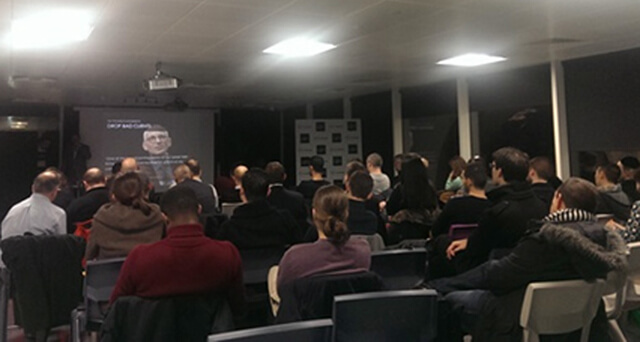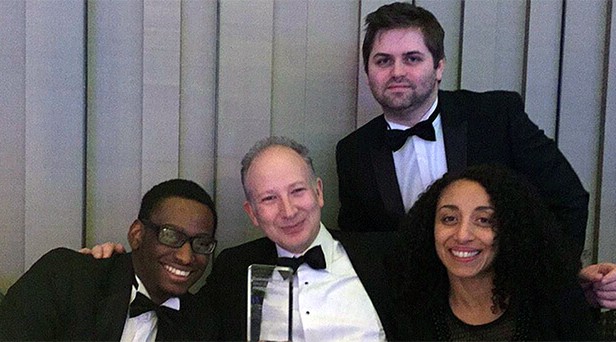This week, Sylvain Reiter and Danny Bluestone shared insight and tips with the audience from Bizoogo about how to build a successful technology business at Rainmaking Loft in Tower Hill, London.
On 9th December 2013, Danny and Sylvain were invited to speak at the Bizoogo event run by Zack Davidovich, one of the organisers of London Startup Weekend and Erez Nounou from Bizoogo, a service that introduces founders to each other. During the 1 hour talk, Danny and Sylvain shared Cyber-Duck’s story and their experience building a successful product and service based business. The directors explained how to scale up from small to large by being clever with clients, staff, marketing and management processes, as well as exploring common traits of prosperous founders.

Danny and Sylvain from Cyber-Duck talk at the Rainmaking Loft.
Danny explained the early vision that he had for Cyber-Duck and how it hasn’t really changed in over 11 years since he first dreamt of starting his own agency. He proceeded to show the audience some of Cyber-Duck’s early projects including The Gilev ShowBand and EcoDrip, explaining how these projects displayed cutting-edge technology and posed a challenge at the time of their launch; helping to shape the future of the business.
Project Management Processes
During the lecture, Sylvain explained how Cyber-Duck embraced processes like Scrum and Danny elaborated on how user-centred design (UCD) and lean techniques are used to deliver projects, products and entire businesses. At this point he elaborated more on the importance of cohort analysis, actionable analytics and the importance of ‘build’ ‘measure’ and ‘learn’ to help a seed idea develop into a successful launch by ensuring the optimum user experience (UX).
Danny explained that by combining agile, lean and UCD with ISO 9001-2008, it’s possible to incorporate a quality management system so that an efficient framework is used to govern all projects. A quality management framework like ISO9001 is central to ensuring client satisfaction, quality objectives, recurring procedures and problem management are dealt with very efficiently within any technology firm.
Traits of a Leader
Danny and Sylvain explained the types of traits founders need. Michael Gerber’s principles of The e-Myth are still true today. Entrepreneurs have to learn the importance of the three types of people you need in a business: leaders, managers and technicians. When starting a business, the founder will often need all of these three traits to truly understand what he or she needs.
They proceeded to elaborate on how techniques like ‘inbox zero’ and the getting things done (GTD) model popularised by David Allen are key traits of any senior staff member and essential to managing your business. Danny explained how it’s important to try to be composed at all times, by following the Rambam’s path of always walking in the middle and ‘acting’ as opposed to reacting. This is especially important when dealing with crises and problems.
The tips offered here echo Stephen Covey’s advice in the book the ‘7 Habits of Highly Effective People’. Danny spoke about the importance of human resources (HR) and how 'hiring staff who are smarter than you' is a funny - yet true! - phrase. He explained that founders should hire T-shaped individuals, a concept popularised by Tim Brown the CEO of the IDEO design consultancy agency. This idea encourages key staff to be experts in one area, but retain the ability to collaborate across disciplines.
Marketing Your Startup
The final part of the talk was focused on marketing and this is where Danny stressed that passion for one’s business is the most important ingredient to success followed by the drive to produce quality. He explained why Aristotle’s theory of persuasion, which includes ethos, pathos and logos is key to success. In simple words this means that we can be far more swaying in our websites and applications if we incorporate credibility, trust, emotional buy-in, along with relevancy to the user, into the design process. The goal of this theory is to ensure that every single touch point with a customer is meaningful and engaging. On this note he explained how using stock photography for example, demonstrates that many brands do not invest in their UX as people (in many instances) can psychologically tell that what they are looking at is stock photography. Danny explained that if firms move into good office space, invest in R&D, do charitable work and run niche events, they can help to expand their business horizons.
View the presentation from the talk below:




